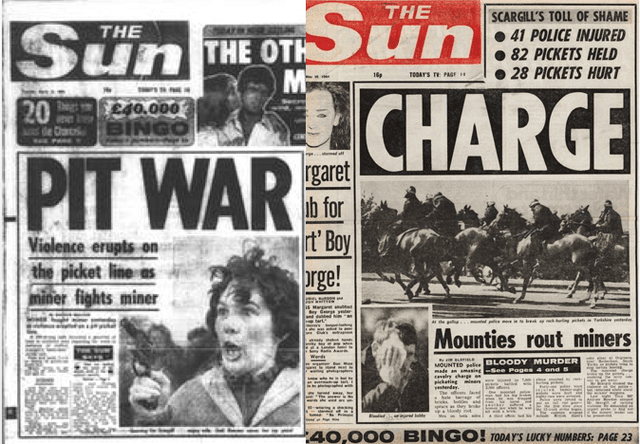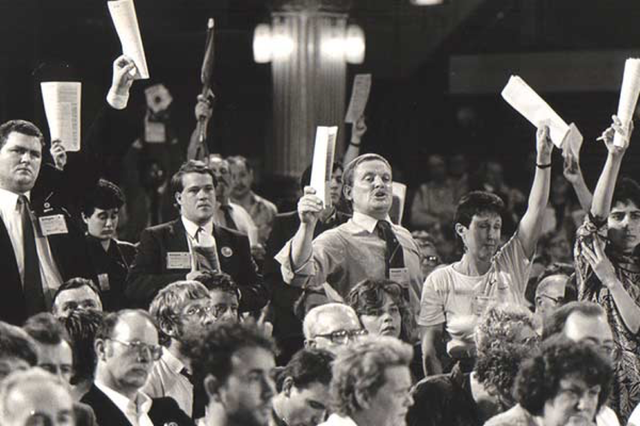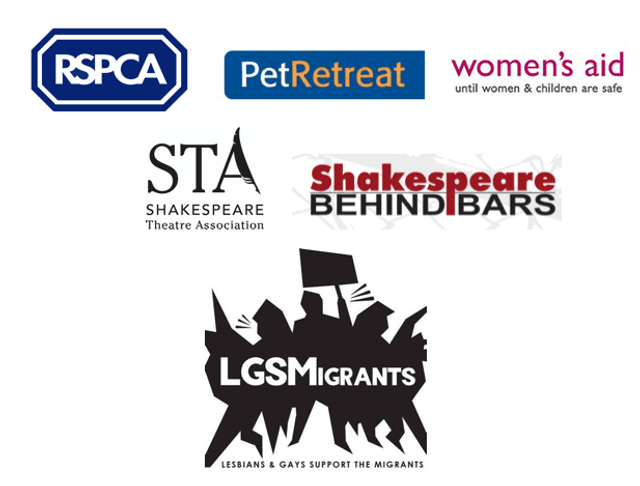Lesbians and Gays Support the Miners
Presented at I Wish I’d Thought Of That London 2018 with a small caveat: ‘queer’ is used throughout as an umbrella term for LGBTQIA+ people and in reference to a ‘lesbian and gay’ group (which they also used for themselves).
- Written by
- Emily Collins-Ellis
- Added
- February 01, 2018

The idea I presented at IWITOT 2018 took place in the mid-1980s. The coal miners’ strike had been going for months and would continue for almost a year. Thatcher sequestered the funds of the National Union of Mineworkers, so anyone who wanted to donate to support miners had nowhere to send their money. Mining families and the villages and towns built around the mines were going hungry and being ostracised, as well as facing police brutality on the picket lines, and being demonised by the media.

Separately, the LGBT community was facing its own problems. AIDS was killing men at an astonishing rate; queer clubs, bars and social spaces continued to be regularly raided by the police; consenting adults were still being registered as sex offenders or arrested for public displays of affection; and Thatcher was leading a ‘family values’ campaign to whip up public homophobia. Queer people and their communities were dying and being ostracised, as well as facing police brutality on Pride marches, and being demonised by the media.
Out of these two bleak and painful circumstances rose a brilliant idea: Lesbians and Gays Support the Miners. A small group of queer people in London decided to align their cause with the strike, and unite against their common enemies, by fundraising to support the miners. Their work went largely unrecognised and existed mainly as myth in queer communities until Stephen Beresford dramatized it in the 2014 film ‘Pride’.
The main thing I love about this idea, is that it goes against so many of our instincts as fundraisers. Trying to raise funds, and encourage support for an unpopular cause? Why add an even less popular cause to your job? Desperately in need of cash to support your struggling community? Why add more people, and their needs, to your responsibility? Trying to find people to partner with that will be open to being associated with your cause? A group of out-and-proud queers didn’t expect to find that in a tiny Welsh mining village.
Nonetheless, they powered ahead. They used Pride parades to rattle buckets for the miners, deflecting homophobia by addressing an issue that the British working class were uniting behind. They invited striking miners to speak at big gay nights in the city, using the events as fundraisers and forging connections between groups of people who would never usually have met. And they did on-street fundraising outside Gays the Word (a queer bookshop in Bloomsbury), getting passers-by to stop and chat about the strike outside of a queer space they would usually rush to avoid.

And it worked! Other LGSM groups sprung up around the UK, but the founding London group alone raised £11k, which equates to about £30k in 2018 terms. This was the most any mining support fund raised in the whole country throughout the strike. It allowed the striking mining community to stay on the picket line for the winter, and gave LGSM and the miners exposure to issues they had never known about before.
Ultimately, the miners’ strike ended unsuccessfully, however, this partnership didn’t end there. The miners went on to return LGSM’s support at the Labour party conference the next year, tabling a motion to enshrine lesbian and gay rights into party policy. Policies like this had been proposed and voted down before, but the National Union of Mineworkers used their block vote to secure policy and manifesto commitments that led the way for same-sex rights in the UK. And at London's Gay Pride march in 1985 the miners came up from South Wales by the busload to march proudly alongside lesbians and gays. They brought such a large contingent that the LGSM group was promoted from the fringe groups to lead the march.

There are other great examples of this too:
- Women’s Aid and RSPCA collaborated to create PetRetreat: fostering for the pets of women fleeing domestic violence.
- The Shakespeare Theatre Association uses its arty donor base to support prison charity initiatives and created Shakespeare Behind Bars.
- And there is now a new LGSM called Lesbians and Gays Support the Migrants who work to support migrants and refugees in the UK
It is a fantastic and challenging idea to collaborate with an unexpected cause to unite against a shared problem, for fundraising and social progress. In a fundraising profession and charity sector where we so often act as competitors, where we’re constantly asking ourselves how we can engage with new donor audiences, maybe some unlikely partnerships can be the key to pushing our causes forward together.

















